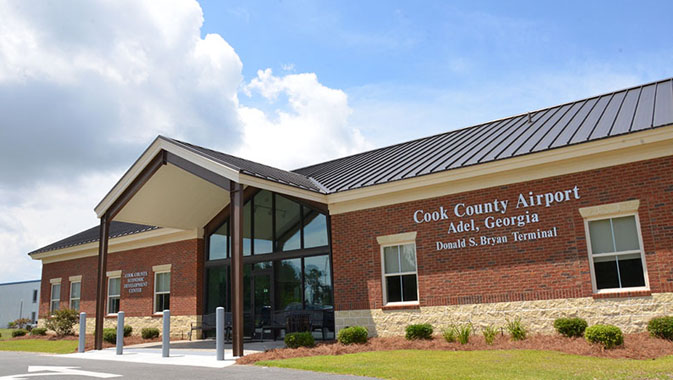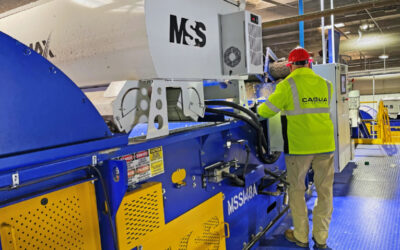In the increasingly competitive and globalized market place, companies are seeking out new areas in which to take root and expand. Cook County, Georgia is one community which has answered the call, providing budding firms the promise of success through access, infrastructure, feasibility and community.
~
The regional competitiveness of the Georgia state economy has gained a substantial amount of corporate attention, sparking a new wave of growth throughout all of Central Georgia, and Cook County is no exception. Located directly off I-75, Cook County is strategically positioned within the fastest growing corridor in the nation, and as a result, the area’s contribution to wider industry has reached new heights.
For centuries, the county’s coastal plain location and abundant natural resources have made it a haven for agricultural firms, but today, a range of sectors including manufacturing and steel are calling Cook home. With an unbeatable location, a trained workforce, and an abundance of natural resources to boot, Cook County’s is entering a new era. But according to Lisa Collins, Director of Economic Development at the Cook County Economic Development Commission, and Buddy Duke, Cook County Economic Commission chairman, it is the community at the heart of Cook County which is the most valuable resource of them all.
Opportunity in Infrastructure
Cook County’s industrial footprint has evolved immensely in recent years, but a closer look at economic development in the area proves that the evolution has only just begun. Cook County has been an agricultural hub for centuries. From soybeans and cotton, to tobacco and even olives, the county’s fertile land has made it an obvious choice for a range of crop and cattle businesses.
As a result of the resource rich location and accessibility to shipping routes, many agriculturally driven businesses including the major poultry processing company Sanderson Farms, and the agricultural chemical manufacturing firm BASF, have found opportunity in Cook.
Although agriculture remains the lifeblood of the area, the county has become a hotspot for the steel and manufacturing industries as well. Today, Cook County is home to the largest PVC manufacturing plant in the country, JM Eagle, several major steel builders, and related ancillary industries. With a locally supported professional training center and several manufacturing-centric workforce training programs, Cook provides manufacturers with all the trappings necessary for success, at a lower cost than that found in other major manufacturing areas.
As a result of Cook’s existing infrastructure and location, the area has invested heavily in the continued progress of the local economy. One of these projects includes the acquisition of a shovel ready megasite. The megasite hosts nearly 3,000 acres of prime industrial land, right off the I-75 corridor. With direct access to not only the interstate, but the rail line and another major highway, U.S. Highway 41, the megasite offers ideal accessibility as well as a robust infrastructure.
350 of the 3,000 acres are certified “GRAD” (Georgia Ready for Accelerated Development), facilitating businesses who are looking to relocate or expand quickly. Ms. Collins explains, “Due diligence has been completed on the 350 acre GRAD site, including ownership security, zoning designation, road and rail accessibility, utilities service, and wetlands and stream delineation. So if a business wants to start quickly we have the land readily available.”
Opportunity in Accessibility
The cornerstone of Cook County’s increasingly diverse industrial footprint is the area’s location and transportation infrastructure. Be it road, air, land or sea, Cook County offers growing businesses a logistical utopia. As Ms. Collins says, “Our location makes us a desirable place for new industries.” Cook offers a gateway to development, providing unparalleled accessibility to the continental U.S. and even international markets. The county’s location has made it a prime spot for companies seeking growth and logistical accessibility for shipping and distribution purposes.
In the heart of Cook County, the I-75 corridor, which reaches all the way from South Florida to Canada, carries nearly 40,000 private and commercial vehicles through the area a day, making the corridor the most travelled in the entire country. As a result of this convergence, Cook County’s central Southeast location is paramount as it is only one day’s drive from nearly 70 percent of the U.S. market.
In addition to providing maximum road access, Cook offers companies routes to trading ports, a rail line and multiple airports. In driving distance to the Port of Savannah, the Port of Jacksonville and the Port of Brunswick, many of Cook County’s existing businesses have outgrown their domestic footprint. Moreover, with the Jacksonville and Atlanta international airports and even a local airport with 28 hangars, Cook County is increasingly attracting global businesses.
Opportunity in Feasibility
When it comes to location, it is clear that in a lot of ways, Cook won the geographic lottery; but the area’s strategic and methodical management of its natural resources is an equally significant driver of local growth.
The county’s natural resources are directly connected to a lower cost of doing business, and offer growth potential for industries across the board. Cook County has leveraged its existing natural capital through creating locally owned resource management companies. “The City of Adel (located in the heart of Cook) owns its electrical, natural gas and water departments; therefore, the rates we charge for our customers are the lowest in the state, making us extremely competitive in those areas,” explains Mr. Duke. Since the City of Adel owns and manages all three of the major utilities in the County, the cost benefit potential of business operations is substantial.
The advantages of this type of commodity management are obvious, but Cook County’s incentive packages extend far beyond that of water, gas, and electric. Georgia has developed a reputation as being one of the most business-friendly states in the nation in terms of taxation and entrepreneurial support. Cook not only offers the highest level of state-based tax incentives, but also local support programs, which make the cost of living and doing business in the county unbeatably affordable. As a result of these benefits, an increasing number of companies are calling Cook County home, finding the financial freedom which can only come from lower overheads. Ms. Collins states that, “We have great local incentives for industry, and on a state level Georgia has excellent incentives as well. It makes Cook County a great place for businesses looking to grow.”
Opportunity in Community
The County’s expanding influence in the nationally recognized growth corridor is a case study in grassroots growth done right. Cook County’s financial environment and strategic location are big attractions for a range of industries; but ultimately, it is the promise of a safe, down-to-earth community which continues to bring in professionals from all over the country.
Economic growth in Cook County has been a team effort, driven by the Economic Development Commission, but supported avidly by the surrounding community. Ms. Collins shares that, “We have leadership from all walks of the community who are committed to growth… they understand that community development and economic development go hand-in-hand. The leadership understands that in order for economic development to be successful, community development must be successful as well.” Home to four new schools, an exceptional graduation rate, several workforce training programs, and close access to universities and technical schools, it is clear that Cook County offers routes to opportunity for businesses and residents alike.













